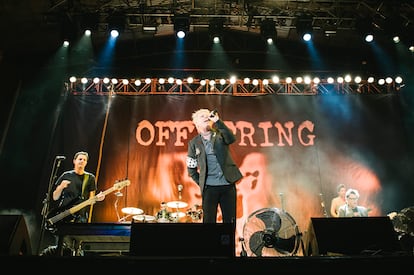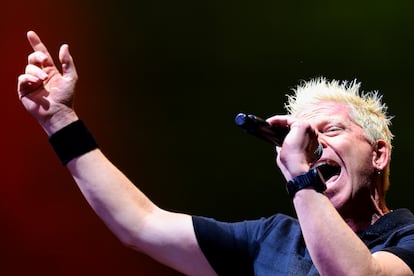They were omnipresent on the radio, but the majority of the public had never even seen the members of The Offspring. Their only references: their singer’s high-pitched voice; the accelerated, almost hardcore beat of the group’s songs and its horrendous album cover, which featured the x-ray of a skeleton. In December 1994, many got a clearer picture. After having turned down several invitations to play Saturday night Live and the David Letterman and Conan O’Brien shows over the course of the year, the Orange County band agreed to play the Billboard Music Awards. Led by vocalist Bryan “Dexter” Holland and his incredibly long dreadlocks, the group came out on stage and performed their repertoire’s least television-friendly song, Bad Habit. Underneath his blazer, Holland was wearing a t-shirt that he exposed halfway through the number. It displayed another rebellious message: “Corporate rock kills bands dead.”
The band played to perfection the role bequeathed to them by the press and their fans. Founded in 1984, a year in which no one looking to get rich would have even considered starting a punk band, The Offspring became a phenomenon that proved difficult to control for its members. Smash, the group’s third release, became available for purchase on the same April 8, 1994, that Seattle police found the body of Kurt Cobain. Distributed by Epitaph Records, Smash is to this day the best-selling album of all time from an independent label, with more than 11 million copies bought around the world. Today, the group’s discography has racked up a total of 40 million albums sold.
In the wake of their smash hit, they became the official rival to Green Day: two months before, that group had come out with Dookie, the album that kicked off the golden commercial age of California punk. The difference was that Green Day had surrounded success on the back of Warner Music, a corporate giant. While the community that congregated at Gilman, the San Francisco Bay Area venue that had been the site of both groups’ early days, was crucifying Billie Joe Armstrong’s band for having sold out, The Offspring remained the real deal, the ones who proved you could take the charts by storm without giving up your principles..
The macabre coincidence with Cobain’s death held much symbolism, even beyond the fact that The Offspring’s trademark song, Self Esteemseemed like a crude plagiarism of Smells Like Teen Spirit. Nirvana and grunge’s triumph had paved the way to the resurrection of punk, the sound that had given birth to both Green Day and The Offspring, and the two groups benefited from that opening. In 1997, music journalist Jesús Llorente, founder of Acuarela Discos, wrote The Offspring: Punkcoreone of the editions of the Spanish language Images of Rock (Images of Rock) series, which publishing house La Máscara was putting out at the time. He defined the Californians as “a group that didn’t want to make things complicated for itself or its fans […] that is reminiscent of a Nirvana without emotional duplicity, lyrical ambiguity or ulterior motives, a Nirvana from the hood.”
“Any radio station could program them, and their sound was accessible to those who thought grunge had become too muddy, too emo, too intense or alternative, and who wanted something fast, simple, easily digestible, but on the other hand, well- made,” Llorente writes. In the slim volume, the journalist cleanly documents the story of the group’s rise as alternative icons until its fall as infidels: that same year, 1997, The Offspring put out its follow-up albumIxnay On The Manwith multinational Columbia Records.
Still, Punkcore recounts how the band had long been in the sights of those who believed the genre required a vow of poverty. Bass player Greg K. had admitted he was losing patience with “hypocrites who criticize us for being on MTV while they spend the afternoons watching it.” “What am I supposed to do? Go to the stations and tell them to stop playing our albums?” Holland reflected at another point.
The kids are not all right
Owned by Brett Gurewitz, Bad Religion’s guitarist, the Epigraph Records label was to 1990s punk what Motown was to 1960s soul. As such, its discography set the standard for the genre’s groups, an example of credible self-management, promotional muscle, and quality. Although Gurewitz initially passed on The Offspring, which put out their eponymous debut album in 1989 via the much-smaller Nemesis Records, the label boss waited for the group to mature musically before he orchestrated a modest launch for their second album (1992’s Ignition) and then, after being satisfied with their melodic evolution evidenced on the first studio recordings for Smash, planned a much more ambitious release for their third album. I have invested $70,000 in the promotional campaign for the group’s single Come Out And Playmore than triple what the entire album had cost to record.

Influenced by other bands from the California scene of the 1970s and 1980s like Dead Kennedys, TSOL and Social Distortion (the latter having been the group’s neighbors in Orange County), The Offspring located in their lyrics a strong political grounding as well as a vindication of the simple desire to have a good time, without one dimension canceling out the other. Holland could sing on Come Out And Play about gang war in impoverished neighborhoods, about drug addiction on What Happened To You? and on Self Esteem, about how bad the girl he liked was making him feel. It was more than enough material to connect, one way or another, with a vast teenaged public.
Smash proved that, even as an independent, a punk label like Epitaph could look big corporations in the eye and get its piece of the foot. With his immense success, the biggest the label would ever score, Gurewitz began to present himself to the media as the visionary who was capable of facing down Goliath, with appearanc
es in Forbes reminiscent of those of a modern self-made magnate. His policy of treating all bands the same, regardless of their success, began to irk The Offspring. In the first place, because a group that had sold several million copies expected certain perks. And secondly, because that policy was a lie: Gurewitz’s focus on and explicit preference for Rancid (he even had a tattoo of the band’s logo) wound up arousing The Offspring’s jealousy.
Rumors that the executive planned to sell Epitaph to a major label proved to be the straw that broke the camel’s back, and The Offspring decided that if they were going to be sold to a multinational company, they’d sell themselves by negotiating their terms and getting rich on their own. Leaving was not a commercial decision, Dexter Holland journalist told Ian Winwood in the book Smash!… Green Day, Offspring, Bad Religion, NOFX and the ’90s Punk Explosion (2018). “We believed that a label should primarily promote the artist, not the label itself. It got harder and harder to deal [with Gurewitz]. “It was hurtful.”

The group, which arguably managed success better than Gurewitz — who became addicted to crack and cocaine during that period, while The Offspring, according to Holland, carefully spaced out its media appearances so as to learn from the tragic experience of Kurt Cobain — made the move to Columbia, and gradually adapted to their new status. The same musicians who had previously turned down the chance to tour with Stone Temple Pilots due to stage fright and a penchant for smaller venues, little by little, established themselves as a stadium band. Ixnay On The Mantheir first album with Columbia, sold less than Smashbut they would later achieve comparable success in 1998 with Americanthe band’s other classic release.
A certain science
Despite the undeniable relevance and influence the group wielded in its time, The Offspring has never topped critics’ lists. The group exists in Green Day’s shadow when it comes to valorization and popularity (with 2004′s American Idiot, Armstrong’s band staged a comeback that widened its base of followers in a way that Holland’s group never achieved), and has had an acceptable, if rarely-lauded, career. Armstrong admitted to Winwood that he thought The Offspring were underappreciated, a thought that the journalist didn’t hesitate to share with readers. Noodles, The Offspring’s guitarist, has also mentioned how the Rock ‘N’ Roll Hall of Fame has admitted several groups from their era, but ignored The Offspring, and that the band has never even been nominated for a Grammy.
“It was a gateway band for people who later discovered Fugazi, or opted for a more nuanced punk. For that fact alone, you have to give them credit. And let’s not forget the number of films, series and video games that feature their songs. On the other hand, I think that their sound has aged a little, sometimes too much,” says Llorente, who in The Offspring: Punkcore he wrote that, despite their success, he found it hard to believe that the group had diehard fans or constituted many listeners’ top band: that they were perhaps more of a side dish. “They’ve always done what they wanted and followed their own path, even today. Putting different amounts of punk and pop into the blender in different eras, in reality, that has never gone out of style, but it was never fully “in.” Is that what happens with the classics? “I wouldn’t go that far, but they’re close.”
With Dexter Holland as the only original member (Noodles nearly is: he joined in 1985, a year after the group formed), the band underwent a new change in its ranks during the pandemic, when drummer Pete Parada decided not to get the coronavirus vaccine . Holland had reasons to take it personally: apart from being a singer, he’s a biologist — the same as Bad Religion’s leader, Greg Graffin, another example of a punk scholar who teaches classes at the same university as Holland — and his doctorate thesis focused precisely on the messenger RNA that forms the basis of how the Pfizer and Moderna vaccines work.
With a new album on the way, the band has a full calendar of festivals in 2024, with a stop in Spain at the summertime Resurrection Fest in Viveiro. With an enduringly solid live set, even if Holland is finding the high notes more and more difficult to hit, the band has been playing concerts dominated by their 1990s hits for years. They’re not trying to fool anyone, nor do they act pretentious to those who still come to see them, an audience that grew up with their sound and has long forgotten any Manichean debate over punk’s place in the music industry. Or perhaps, they never cared about it in the first place. Fat Mike, the singer of NOFX, a band that always resisted the lure of the major labels, may have settled the matter in Smash!…: “Neither The Offspring nor Green Day were sellouts. Neither of those bands knew they were going to make it big. They didn’t write their music to make it big. The only thing that happened is that millions of people discovered that punk is fabulous.”
Sign up for our weekly newsletter to get more English-language news coverage from THE COUNTRY USA Edition
#Nirvana #hood #Offspring #sold #million #albums